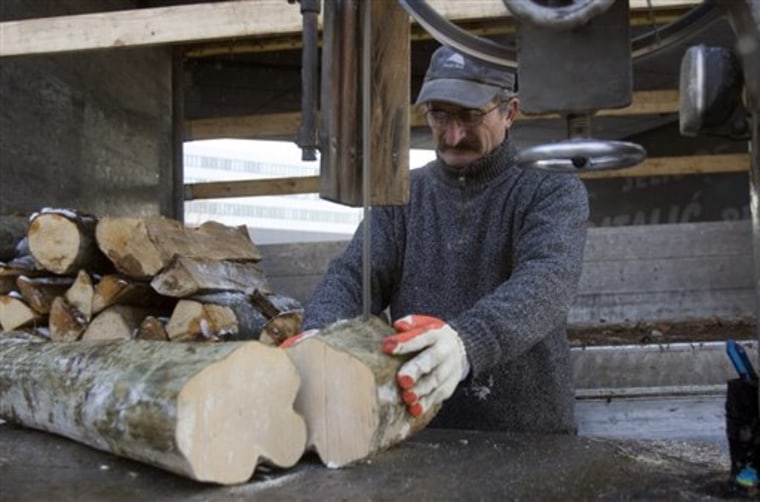European nations shivering amid a cutoff of Russian natural gas should form a consortium to purchase from Russia the fuel that is needed to pump the gas west though Ukraine's pipelines, Prime Minister Vladimir Putin suggested Thursday.
The proposal was a new suggestion for solving the nine-day crisis that has cut off nearly all gas to some countries in Europe and sparked anger in European capitals and homes. But it addresses only one of the many complex and contentious issues dividing Russia, the gas supplier, and Ukraine, the pipeline owner.
For the third day in a row, Russia's state-controlled gas giant Gazprom opened a tap near the border Thursday and asked Ukraine to send a limited amount of gas on to Europe. Ukraine's state-run gas company Naftogaz refused, saying the route Gazprom demanded would force Ukraine to shut off energy supplies to millions of Ukrainian consumers first.
Europe gets about one-quarter of all its gas from Russia, with 80 percent of that coming via pipelines that cross Ukraine. Russia stopped selling gas to Ukraine for domestic use on Jan. 1 because Kiev refused Moscow's price demands. Russia then accused Ukraine of siphoning off Europe-bound gas and stopped sending any into Ukrainian pipelines on Jan. 7.
After EU monitors went out to Ukraine to check on gas flows, Russia turned on the taps Tuesday, but little or none of that gas has reached Europe.
Ukraine is also demanding that Russia supply the so-called "technical gas" needed to power compressors that push Europe-bound gas farther down the pipelines. Previously, Russia insisted that Ukraine pay for that, or accused it of stealing that gas.
Several million dollars a day
Ukraine's sprawling, inefficient pipeline system uses a substantial amount of technical gas, so the issue involves several million dollars a day.
Putin, in a meeting with the head of Italian gas concern ENI, proposed that a European consortium buy the technical gas from Russian gas monopoly Gazprom. ENI head Paolo Scaroni characterized the proposal as "constructive," according to Russian news agencies, but other countries' reactions were not immediately known.
"We have to help our Ukrainian friends while they are incapable of ensuring the transit, but ... Russia is not ready to take all the risks," Putin spokesman Dmitry Peskov told reporters.
Valentyn Zemlyansky, a spokesman for the Ukrainian natural gas company Naftogaz, said "Ukraine is ready to discuss this proposal."
Peskov said the consortium would give the technical gas an "international character" that would discourage Ukraine from stealing it. He also said Ukraine ultimately would have to pay for the gas, but that prices have not been discussed.
Russia's demand that Ukraine pay $450 per 1,000 cubic meters of gas in 2009 — more than twice what it paid last year — is one of main economic issues in the dispute, which also involves a struggle for dominance between the two uneasy neighbors.
Desperate to restore supplies
Desperate to restore supplies, the European Union said Thursday it was ready to join a proposed summit including Russia and Ukraine to seek a solution to the crisis. But where and when and even if that meeting would take place remained unclear.
Russian President Dmitry Medvedev wants it to be in Moscow, while Ukraine says it should be held somewhere in the European Union.
Putin and Ukrainian Prime Minister Yulia Tymoshenko have agreed to meet Saturday in Moscow on the crisis, officials said.
The EU said it was ready to send Energy Commissioner Andris Piebalgs and Czech Energy Minister Martin Riman — whose country currently holds the EU presidency — to the talks, provided that both the Russian and Ukrainian leadership were fully involved.
But Ukraine's President Viktor Yushchenko, Tymoshenko's bitter rival, has indicated he would not attend a summit held in Moscow.
Relations between the two former Soviet republics have been badly strained since the 2004 Orange Revolution propelled pro-Western leaders to power in Kiev.
Merkel calls for meeting
German Chancellor Angela Merkel said she was calling Ukraine and would press Putin when she meets him Friday in Berlin.
"It is absolutely essential for us to see both Russia and Ukraine sit down at the negotiating table and resolve their issues," she said.
The crisis has left several European nations with little or no gas for heating and electricity.
Bulgaria, one of the hardest-hit nations, said Thursday it was seeking emergency energy deliveries from Greece and Turkey. Serbia and Croatia, also struggling, were lashed by icy rain and snow this week. Hospitals said hundreds in Serbia broke arms, legs or hips, or suffered concussions in falls.
